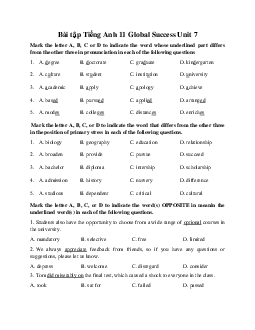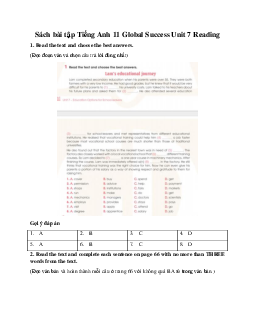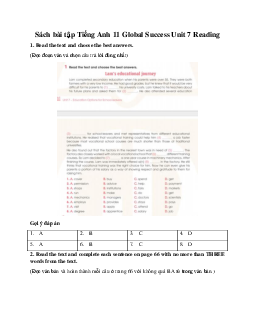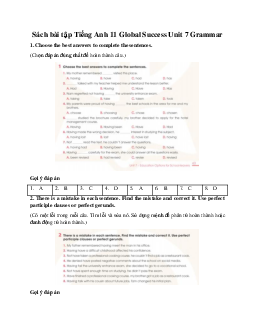



Preview text:
Tiếng Anh 11 Global Success Unit 7 Communication and Culture/ CLIL Everyday English
Making an appointment (Đặt lịch hẹn)
1. Listen and complete the conversation with the expressions in the box. Then practise it in pairs.
(Nghe và hoàn thành cuộc hội thoại với các biểu thức trong hộp. Sau đó thực hành nó theo cặp.) Gợi ý đáp án 1. D 2. C 3. A 4. B
2. Work in pairs. Use the model in 1 to make similar conversations for these
situations. One of you is Student A, the other is Student B. Use the expressions below to help you.
(Làm việc theo cặp. Sử dụng mô hình trong phần 1 để tạo các hội thoại tương tự cho các
tình huống này. Một trong số các bạn là Học sinh A, người kia là Học sinh B. Sử dụng
các biểu thức dưới đây để giúp bạn.) Gợi ý đáp án
1. A: Hello, I'm a secondary school student and I'm interested in getting some advice on
my education plans after leaving school. Can I make an appointment with you?
B: Sure, that sounds great. When were you thinking of meeting?
A: How about next Monday afternoon?
B: I'm afraid I have another meeting then. Could we meet on Wednesday instead?
A: Yes, Wednesday works for me. What time would be suitable for you? B: How about 3 p.m.? A: That's perfect. Thank you.
2. B: Hello, I'm a secondary school student and I'm interested in getting some advice on
vocational courses. Can I make an appointment with you?
A: Of course, I'd be happy to help. When were you thinking of meeting?
B: How about next Tuesday morning?
A: I'm sorry, I have another appointment at that time. But I'm free on Thursday afternoon.
B: Thursday afternoon works for me. What time suits you to see you? A: Would 2 pm be okay?
B: Yes, that works for me. Thank you. Culture
1. Read the text and complete the table below with information from the text. Use no
more than TWO words or a number in each gap.
(Đọc văn bản và hoàn thành bảng dưới đây với thông tin từ văn bản. Sử dụng không quá
HAI từ hoặc một số trong mỗi khoảng trống.) Gợi ý đáp án 1. 18 2. technical education 3. higher education 4. univerity courses 5. bachelor’s degree 6.
2. Work in groups. Discuss the similarities and differences between education after
leaving school in Viet Nam and in the UK.
(Làm việc nhóm. Thảo luận về những điểm tương đồng và khác biệt giữa giáo dục sau
khi rời ghế nhà trường ở Việt Nam và Vương quốc Anh.) Gợi ý đáp án Similarities:
Both countries offer vocational education as an alternative to traditional academic
education after secondary school.
In both countries, students can continue their education after secondary school to
obtain a bachelor's degree, master's degree, or a doctorate.
In both countries, grades are important for further education, with students
needing to achieve good grades to progress to higher levels of education. Differences:
In Vietnam, there is a strong emphasis on academic education, with vocational
education being seen as a secondary option. In contrast, vocational education is given
more importance in the UK and is often referred to as career education or technical education.
In the UK, students have the option of attending sixth-form colleges or staying at
their secondary schools for two more years to study subjects they are interested in or
subjects related to higher education. Such an option is not available in Vietnam.
The education system in Vietnam is heavily influenced by the government and is
more centralized, while the UK education system is more decentralized and allows
for greater autonomy in decision-making by schools and teachers.
The length of time spent in university in Vietnam is longer compared to the UK. In
Vietnam, a bachelor's degree can take up to five years to complete, while in the UK, it takes three years.
These are just a few examples of the similarities and differences between the
education systems in Vietnam and the UK. Students in the group discussion can
explore these points in more detail and also add their own observations and
experiences to the discussion.




